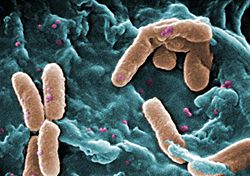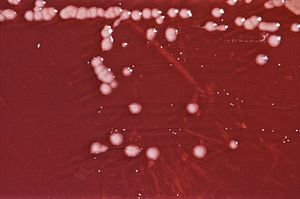Pseudomonas facts for kids
Quick facts for kids Pseudomonas |
|
|---|---|
 |
|
| colourized scanning electron micrograph (SEM) of some Pseudomonas aeruginosa | |
| Scientific classification | |
| Kingdom: | |
| Phylum: | |
| Class: | |
| Order: | |
| Family: |
Pseudomonadaceae
|
| Genus: |
Pseudomonas
|
| Type species | |
| Pseudomonas aeruginosa |
|
Pseudomonas are a group of tiny living things called bacteria. They are so small you need a powerful microscope to see them! These bacteria belong to a larger group known as gammaproteobacteria. You can find Pseudomonas bacteria in many different places all around us.
What are Pseudomonas?
Pseudomonas are a type of bacteria that are part of the family called Pseudomonadaceae. There are many different kinds, or species, of Pseudomonas. Some of these species are very common and live freely in nature. Others can live inside plants or animals.
Where do they live?
These bacteria are very adaptable. This means they can live in many different environments. You can find Pseudomonas in soil, in water, and even on the surfaces of plants. They can also live inside the bodies of animals and humans. They are found almost everywhere on Earth!
Are they always harmful?
Most bacteria are harmless, and some are even helpful. However, some Pseudomonas species can be pathogenic. This means they can cause sickness, especially in humans or animals that are already unwell or have weak immune systems.
For example, a species called Pseudomonas aeruginosa can sometimes cause infections. This can happen more easily after someone has taken antibiotics. Antibiotics are medicines that kill bacteria. When antibiotics kill other bacteria in the body, Pseudomonas might have less competition. This can allow them to grow quickly and cause problems.

See also
 In Spanish: Pseudomonas para niños
In Spanish: Pseudomonas para niños
 | Jackie Robinson |
 | Jack Johnson |
 | Althea Gibson |
 | Arthur Ashe |
 | Muhammad Ali |

